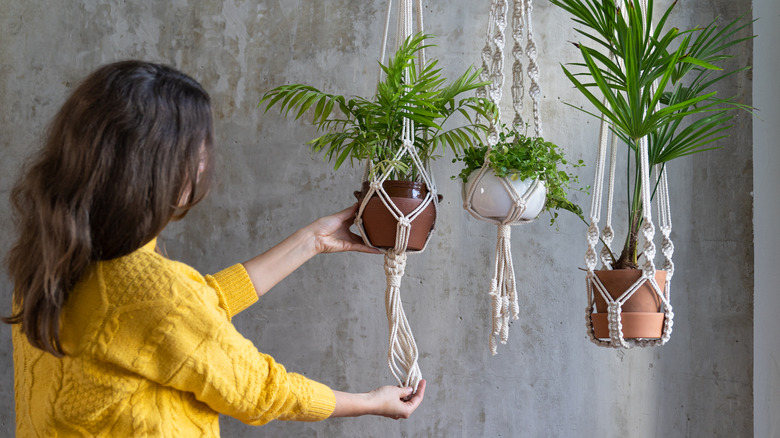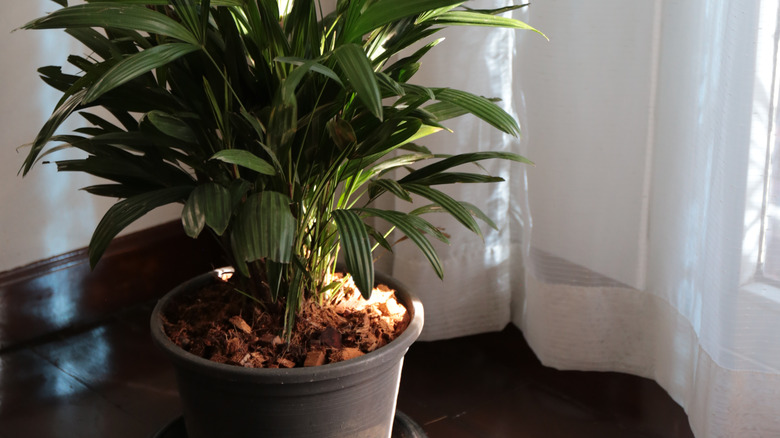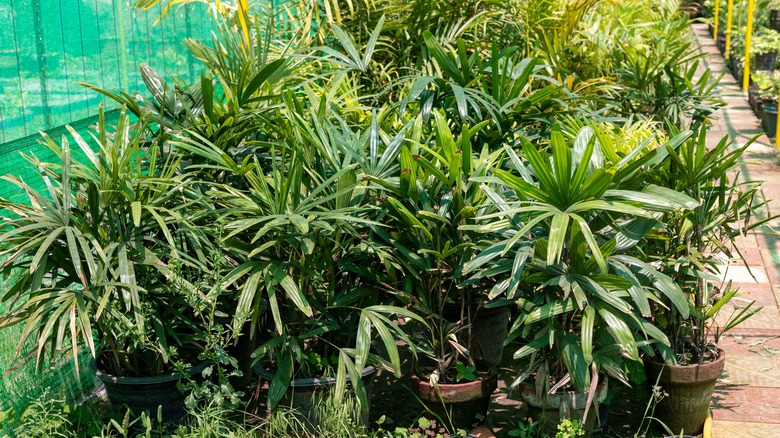Why You'll Want To Bring A Lady Palm Plant Into Your Home
We all have that disused spot in our house where little sunlight reaches. You want to put a showy potted plant there, but nothing thrives in the low light. Boy, have we got a palm for you! Lady palms are arguably one of the palm plants that grow best indoors, making them a must-have addition to your ever-growing houseplant collection. They're easy-care greenery that shies away from full sun, thrives in humidity on the lower side, and avoids disease. Put a lady palm or two in your home to improve indoor air quality, reduce allergens, and channel your inner 1920s Bright Young Thing.
Lady palms, or Rhapis excelsa, are native to East and Southeast Asia and once grew wild in forests from southern China to northern Vietnam. They're naturalized in Japan, Thailand, and Trinidad and Tobago. As subtropical understory plants, their cane-like stalks topped with fans of deep green leaves reach about 7 feet at their tallest — though they're still considered a dwarf palm. The plants boast sprays of small white flowers in the summer — followed by non-edible white or red fruit — and aren't fans of basking in full sun. That's why they make a great house or patio plant. They have a ton of monikers, some of the most common being Rhapis flabelliformis, broadleaf lady palm, bamboo palm, ground rattan, fan tufted palm, and miniature fan palm. In the U.S., it grows outdoors in Hardiness Zones 9A to 11; otherwise, you need to keep it indoors.
Benefits for health and home
Lady palm is a tropical houseplant that helps keep the air in your home free from formaldehyde, xylene, and ammonia. A 2015 study by a Universiti Putra Malaysia researcher found Rhapis excelsa outperformed other common houseplants — namely Dracaena fragrans and Nephrolepis exaltata — in removing VOCs from the air. The plant may also help people with allergies. Researchers behind a paper published in the Journal of the Japanese Society for Horticultural Science in 2013 included lady palm in their study of air-pollutant-dispelling plants in classrooms. While not dramatic, the results were positive: asthma and rhinitis incidents in school children were reduced.
On the more esoteric side, feng shui practitioners place it in significant spots indoors to balance energies in a space and boost wisdom and growth. In China, where the plant originates, the stems are used to make chopsticks and walking canes, though it's probably unlikely you'll want to get so crafty with your lush ornamental! If you have a chew-happy pet known to chow down on any and all plants you bring into the house, a lady palm will leave you fret-free. The ASPCA lists the plant as non-toxic for cats and dogs. And, like the many different kinds of palm trees out there, it's really lovely to look at, especially if you're a fan of Art Deco interiors — palms, after all, are a staple of 1920s textiles, fashion, and interior trends — or want to add some tropical elements to your home design.
Little care and it's everywhere
This fast-growing plant requires little maintenance outside of watering — and even then, not that much since it's pretty drought tolerant — and occasional feeding. It's somewhat susceptible to nutrient deficiencies when grown in pots indoors and not fertilized appropriately with a balanced slow-release fertilizer. Lady palm is even great for small spaces, often appearing in lists of plants that will thrive when you live in an apartment. It spreads by rhizome offshoots or suckers, so it divides easily. In fact, owners need to divide it once it outgrows its existing container, or it will become rootbound and fail to thrive. Also, it's pretty much disease-free, aside from mild leaf spot diseases and some insect pests.
Convinced? All that's left is to get your hand on the plant. If you know someone with one, chances are they'll need to divide it in the future. Ask them for a few suckers to replant and get yours for free! It's a popular houseplant, so other free or cheap options include trying your luck with your local Buy Nothing group (there's a group finder on the organization's website) or Facebook Marketplace. Lady palm plants are also widely available for sale online. Head to Walmart for a 6-inch potted lady palm for $29.99. The same size plant is $39.97 at Eureka Farms. Don't want to wait for a plant to grow up? Mickey Hargitay Plants sells 6 to 7-foot lady palms in 7-gallon pots for $595 each.


